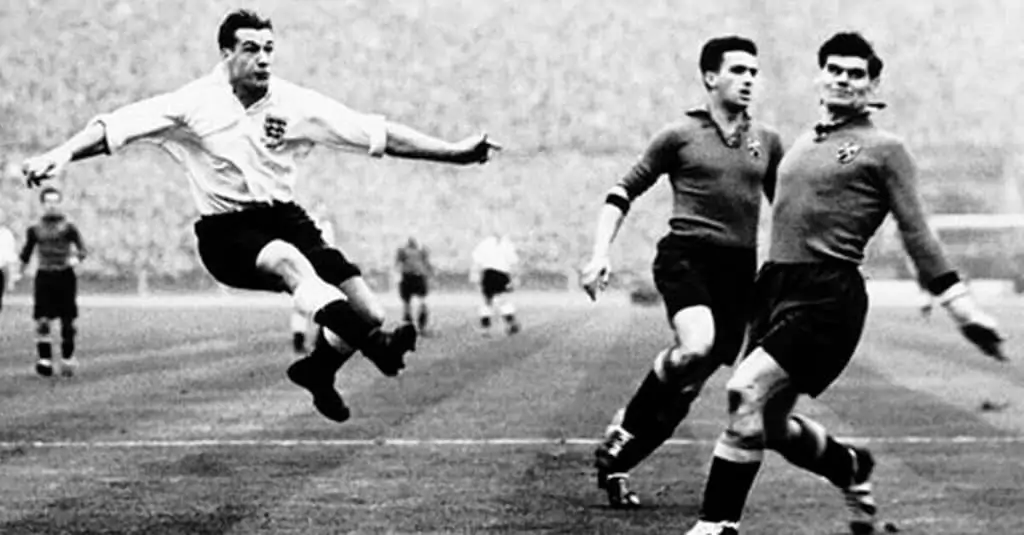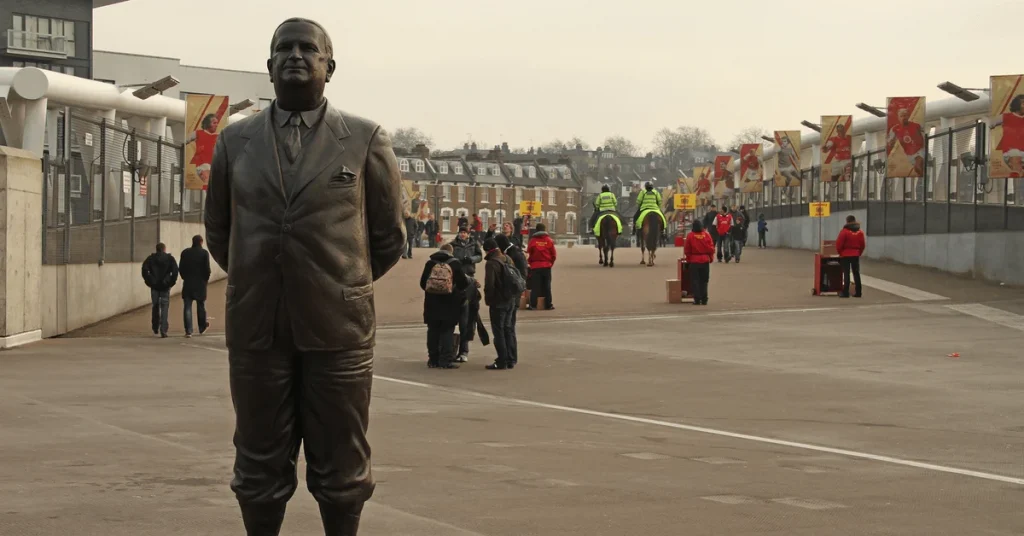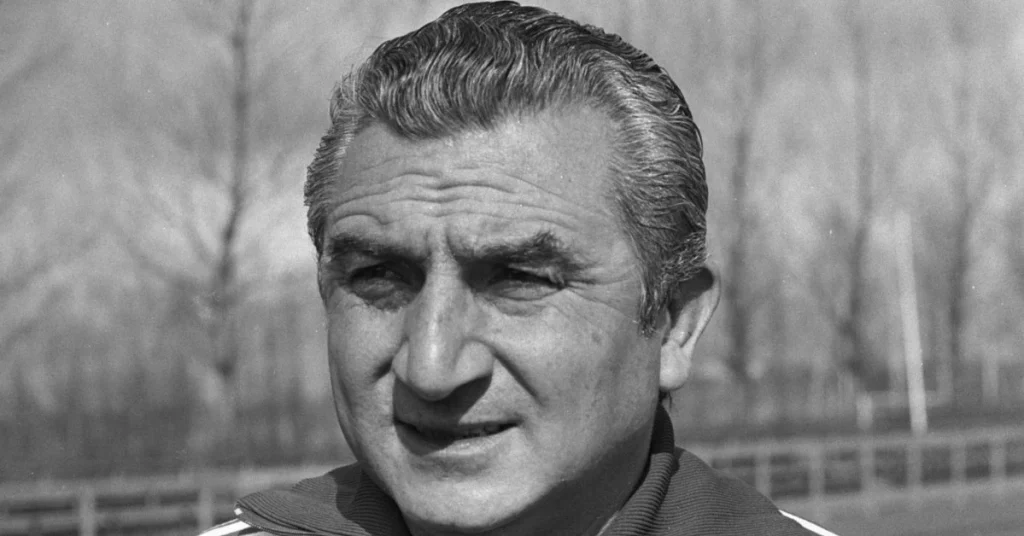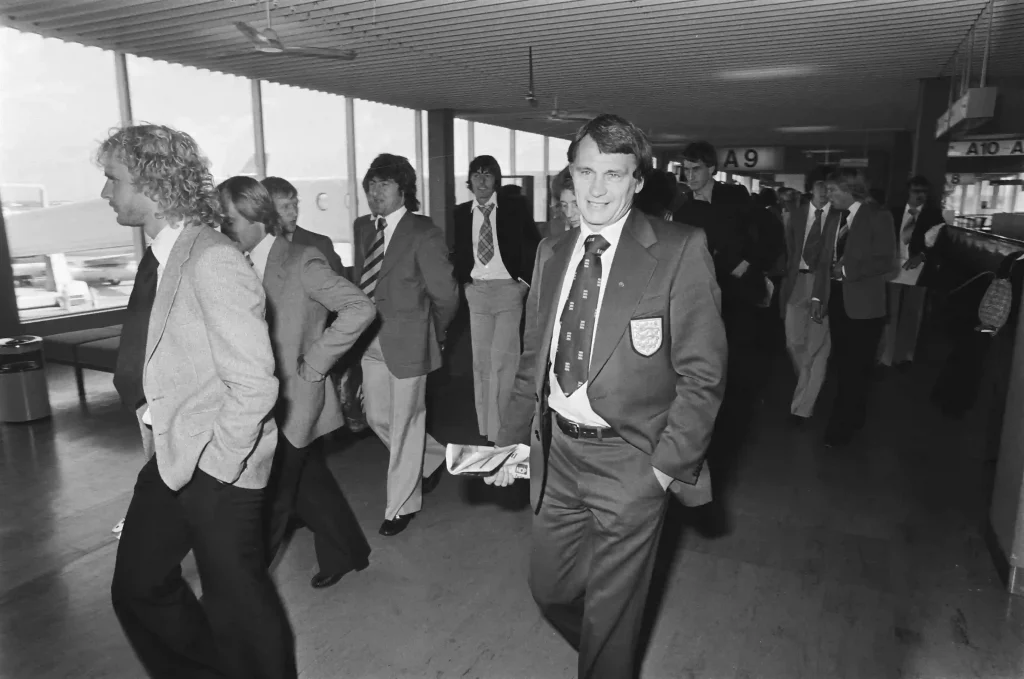A forward for Bolton Wanderers for the entirety of his career, Nat Lofthouse was an English professional footballer. His goals-per-game ratio was among the highest among all England players between 1950 and 1958, during which he won 33 caps for England. As a result, Nat Lofthouse was nicknamed the Lion of Vienna. For the recognition of club and country, a statue stands outside Bolton’s stadium.
The 1952 tour
England toured Europe briefly in summer 1952 and played matches against politically sensitive opponents Italy and Austria. During the Second World War, both countries were major allies of Nazi Germany. Additionally, the development of the Cold War affected the trip to Austria.
Its capital cities, Berlin and Vienna, were also divided into four by the four Allied Powers (Britain, the United States, the Soviet Union, and France). Despite the tense situation in Austria and Germany, British troops crossed into the Soviet sector for the match in May 1952, which took place in the Soviet sector of Vienna.
The historian Percy Young briefly described the situation regarding the two matches. ” There was a tense atmosphere in both countries in 1952 when memories of recent misfortunes were mixed with a present sense of injustice and a zeal for spiritual and national renewal. As always, football matches were symbolic.”
Hostile Environment
Football was also a significant sport for the two nations. In the 1930s, Austria had been among the great Central European football nations. By 1951 it had begun to recover from the war’s ravages. In the 16 international matches played since November 1949, 10 have been won, and only two have been lost.
From England’s perspective, it was necessary to note that Austria had defeated Scotland twice during this run and achieved a 2-2 draw at Wembley. Italy had already won the World Cup twice, and football had returned to its former glory following the war.
The tour began with a 1-1 draw between England and Italy in Florence. As it turned out, the England team ended up on the receiving end of a brutal match. In the following Sunday’s game with Austria, England was widely considered as an underdog. Although the England players have not yet abandoned hope, the home team was 2-1 favorites to win this match.
This match determined which of the two nations would call themselves ‘Champions of Europe’ in many parts of Europe. Ultimately, the Hungarians cruelly exposed England’s insecurities in May 1954 and November 1953 against Continental opposition. As far as the future was concerned, these results were not isolated, and these signs were already in evidence. As a result of the United States’ defeat in the 1950 World Cup in Brazil, the national team lost its confidence when playing outside their comfort zone of the Home International Championships.
Firsts For England
For England, the Austria game provided two firsts. This was the first time the team played behind the Iron Curtain, and it was also the first peacetime match in Continental Europe with a significant away following.
As many as 1,400 tickets were assigned to British troops, although many more were obtained through the black market. Vienna’s Soviet Zone is home to the Praterstadion, where the match was played. Thousands of England fans attended it. Thousands of England fans attended the game at the Praterstadion in Vienna’s Soviet Zone, as evidenced by the Pathé film of the game. In addition to their colorful rosettes, red, white, and blue rattles, and chants of England, they instilled a carnival atmosphere around the stadium, evoking the atmosphere associated with an FA Cup match.
The poor performance of England against Italy almost certainly played a role in the game’s outcome against Austria. Several players in the match played below their level, with Nat Lofthouse one of those.
In the Daily Telegraph, Frank Coles wrote, “One of the question marks is against Lofthouse. If he fails again to accept changes from the clean breakaways against Italy, England will be doomed.” Lofthouse was well aware of his uncertain status, saying later, “I knew I played poorly in Florence … [but] I wasn’t prepared for the reception I received in the press.”
A Battered Nat Lofthouse
Nat Lofthouse had endured well against a battering from the Italian defenders, despite these suggestions of poor performance. He looked like a boxer at the end of a tough 15 rounds when he left the field.
Austria and England played a classic international match in Vienna, combining physical, influential English players with a technically proficient Austrian team to display steel and brute strength when needed.
Austria Line Up
Josef Musil, Rudolf, Rockl, Ernst Happel, Walter Schleger, Ernst Ocwirk, Theodor Brinek, Ernst Melchior, Gerhard Hanappi, Robert Dienst, Adolf Huber, Walter Haummer. (Subs) Franz Pelikan, Stotz, Koller, Dekker
England Line Up
Gilbert Merrick, Alf Ramsey, William Eckersley, William Wright, Jack Froggatt, James Dickinson, Tom Finney, John Sewell, Nat Lofthouse, Edward Baily, William Elliott. (Subs) Ronnie Allen, Ivor Broadis, Bill Nicholson, Stan Pearson, Bert Williams.
Attendance: 65,500
White shirts were worn by Austria and red by England. There was a light breeze and intermittent rain during the game. In the 11th minute, Melchior hit Eckersley with a shot that struck his arm. In response to penalty appeals, the referee awarded a corner. Throughout the opening 20 minutes, Austria dominated, but England responded. Elliott’s pass to Baily was impressive. Lofthouse stood unmarked on the right side of the penalty area when Sewell crossed the ball. To open the scoring, he swiveled on his right foot and hit a volley with his left foot. However, the lead was short-lived.
Dienst was tripped by Froggatt on the edge of the penalty area, and Huber equalized from the penalty spot. After Jackie Sewell restored the lead, Nat Lofthouse headed against the crossbar. Before halftime, the English defense opened up, allowing Dienst to fire past Merrick and level the scores.
Different Team Second Half
As the game progressed, it became more fraught. The Austrians went on the offensive to boot every English player on the pitch. The main target was Nat Lofthouse, who was struck in the neck, while Elliott and Sewell required treatment from England trainer Jimmy Trotter.
England conceded 24 free kicks, while Austria conceded 19. The total number of free kicks might seem insignificant today, but for soccer in the 1950s was significant.
Seven minutes before the end, the climax occurred. Merrick plucked a corner cross from the air, who threw a long, swerving ball down the middle of the field. This was touched on to Lofthouse on the halfway line by Finney. Despite Ocwirk’s efforts, Lofthouse was able to slip past him. The crowd in the stands cheered Lofthouse on.
As Lofthouse recalls, “I heard the hounds running after me.” Musil began running but stopped before he reached me. He hesitated before he emerged at my side. It was important not to strike the ball too soon. Musil had to commit fully before I struck the ball. I hit it when he was right on top of me. After that, Musil crashed into me, and we both fell to the ground.
Lofthouse, battered and semi-conscious, was taken from the field but returned as a passenger minutes later, still proving fit enough to shoot an effort 30 yards into the goal. Around 200 fans stormed the pitch after the final whistle sounded, creating a fantastic scene.
The Victory
For the Daily Mail, Roy Peskett described the events clearly. This evening, the Prater Stadium in the Soviet sector was crowded by cheering, khaki-clad British soldiers waving Union Jacks. There were England Soccer players dotted among them, their red shirts feeling like poppies in a field of corn as they were carried high in triumph to their dressing-room on the shoulders of the Dorsets, the Warwicks, the Signalmen, and the Gunners.
It was an unexpected win against all odds. After gaining eight corners to England’s none, the Austrians dominated for most of the game. Despite this, England won the game in a hostile country despite suffering physical battering. The climax of the match led Peskett to show his joy: “This was more than any other British triumph to have befallen a side abroad… this was an ending to a schoolboy’s story.”
The Daily Express’ Desmond Hackett writes, “For Austria, it was the win they never saw coming.”. To prove it, they battered England with arms, legs and heads. … Never again will you say that England has lost the will to fight. A single man did not give up. Everyone left with a scar or bruise.”
The previous week, Nat Lofthouse was heavily criticized, but now he’s the great hero, according to the headlines.
The Lion Of Vienna
Compared to the broadsheets, tabloid match reports treat the occasion as a related event to the war. On foreign soil, the English brave and plucky had triumphed over technologically superior opponents against all odds. It was much like the story told about the war that had now ended – they were battered and bruised but had come out on top. The military nature of this event was further underscored by the presence of so many British soldiers in uniform. As a result, Nat Lofthouse became known as the ‘Lion of Vienna’ by the Daily Express newspaper.
During Lofthouse’s career, Vienna played a crucial role. In the spring, he was awarded the Football Writers’ Association (FWA) ‘Footballer of the Year’ title, a clear indication that he had achieved the status of a model professional. A vote of the Football Writers Association members, which functions like a jury, selected the professional player who best exemplified footballers’ precepts and examples as the player of the year.
Harry Johnston (1951) and Syd Owen (1959), among others and more apparent candidates, Stanley Matthews and Tom Finney, won this award for their model-professional status, loyalty to club and country, and scrupulously fair approach to the game.
Six Goals In One Match
In September 1952, Nat Lofthouse scored six goals in an interleague game against the Irish League. A runner-up medal and the Footballer of the Year award came to him in 1953, and a winners’ medal and the FA Cup in 1958. Lofthouse played his last match against Birmingham City in December 1960 due to an ankle injury.
In 452 Football League appearances for Bolton, he scored 255 goals. He holds this record to this day. Additionally, he and Tom Finney had the England scoring record together until Jimmy Greaves came along.
Nat joined Burnden Park’s backroom staff several years ago, eventually becoming the club’s manager in August 1968. The club remained close to him after that, and he served as its general manager, scout, and president as of October 1986. Bolton’s all-time greatest player was a gentleman throughout the league.
The OBE was awarded to him in 1994. The evening of Saturday, 15 January 2011, Nat Lofthouse passed away at the Bolton nursing home.
Nat Lofthouse Facts
Between 1950 and 1958, he played 33 times for the England national football team.
On 22 March 1941, he made his debut for Bolton, scoring two goals in a 5-1 victory over Bury.
Nat Lofthouse captained Bolton against Manchester United in the 1958 FA Cup Final. Three months earlier, United had been involved in the Munich air disaster. Nat Lofthouse scored a brace in Bolton’s 2-0 win.
As far as England’s league goalscorers are concerned, Nat Lofthouse is 37th all-time. He is third in the Premier League (old Division 1) list behind Jimmy Greaves (357) and Alan Shearer (283). In 4th position is Ian Rush on 233 goals, then David Herd on 223 goals.
Sources: Daily Express, Daily Mail, Daily Telegraph, The Times, Daily Mirror, The Guardian, Daily Herald; Nat Lofthouse, Goals Galore, Nat Lofthouse. The Lion of Vienna, Fifty Years a Legend (Edinburgh, 1989); Billy Wright, The World’s My Football Pitch (London, 1953); Percy M Young, Bolton Wanderers (London, 1961); England Beat Austria, Pathé Film; Dave Russell, Deeply Honoured: The Rise and Significance of the British Sporting Award.
Images:
GreavsiePic (main image)





